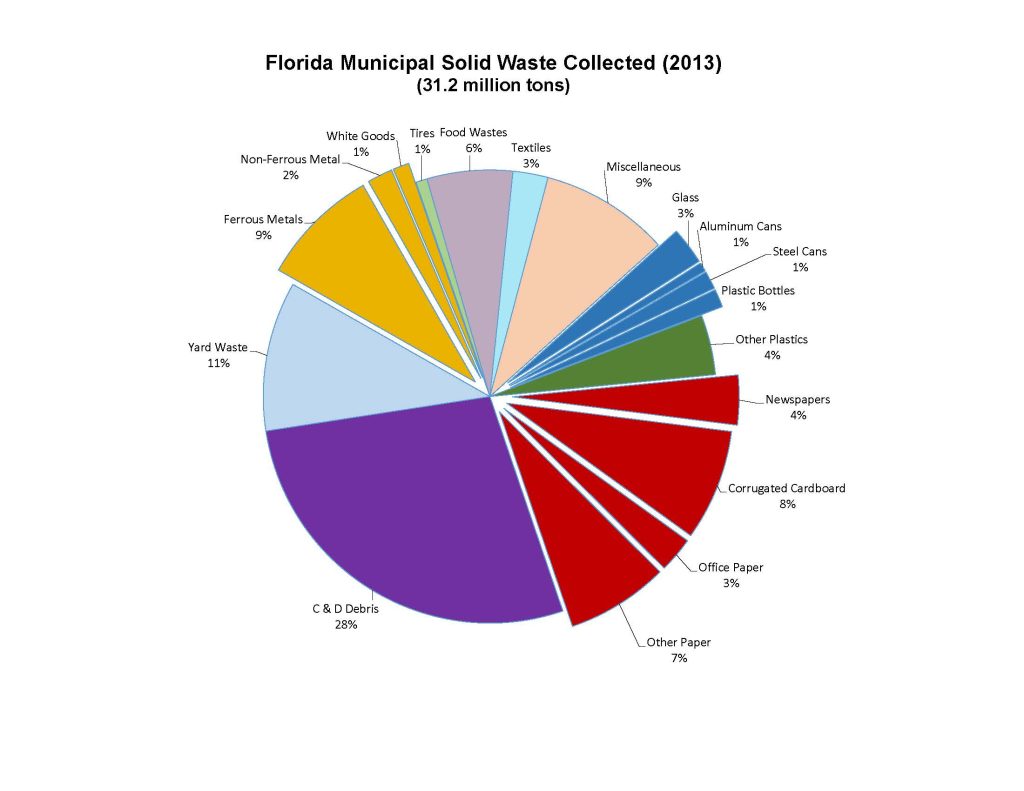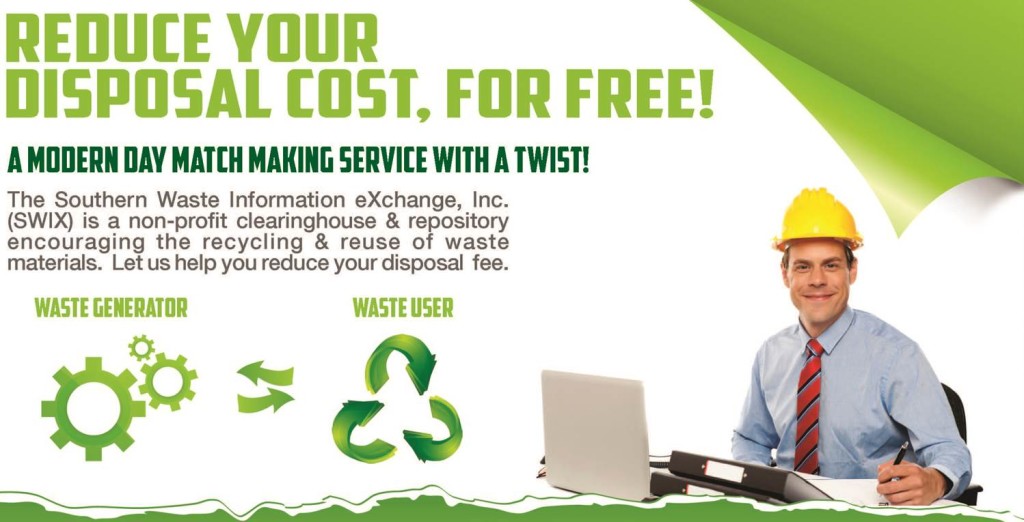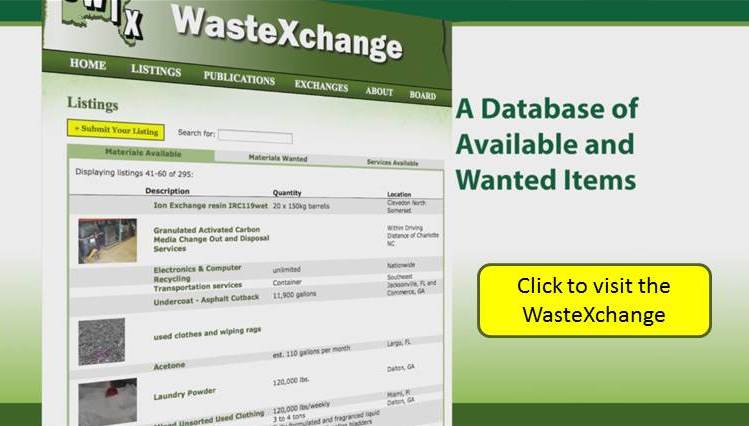Stop Wasting! 7 Steps to Cut Costs, Reduce Waste
Reducing waste for your Florida business will cut costs, reduce environmental impact, build team morale, lessen future liability and attract more business
Waste! Over 31.28 million tons of solid municipal waste was collected in Florida in 2013 – this is a 12% increase from 2012. Commercial and industrial businesses contributed approximately 55 percent of that total, or 17.08 million tons. All this waste offers tons (literally) of opportunity to ease the environmental and economic burden that waste places on businesses in the beautiful sunshine state. This goal of this blog is to outline important considerations surrounding waste and to provide waste reduction strategies that are clearly defined and easy to implement.
Source: Florida Department of Environmental Protection (click for full-size image)
What is waste reduction?
Waste reduction refers to reducing the amount or toxicity of waste generated or reusing materials. By not creating waste in the first place, problems connected with the management (and cost) of waste are avoided.
Why is it important to practice waste reduction?
- Save money on supplies.
- Conserve natural resources and energy.
- Reduce current garbage disposal costs and provide a hedge against rising future disposal costs.
- Give customers what they want – “green” products and environmentally “friendly” businesses.
- Avoid adding to the environmental burden caused by the production and disposal of unnecessary materials.
- Boost employee morale by having staff work together on an environmental project.
- Reduce future liability associated with disposal of solid wastes.
How to Reduce-Reuse-Recycle
Reducing Waste Production – The most direct way to cut your disposal costs is with source reduction: that is, by reducing the amount of waste your business produces. You have less to get rid of if you purchase and discard less material. By analyzing your business’ waste stream, you will probably discover that you can eliminate much of the waste your business produces.
Reusing Waste Material – A cost-efficient method of reducing waste is to reuse products in their present form. It is usually cheaper to clean or repair products so that they can be reused rather than to buy new or recycled ones.
Recycling – Many of the products that cannot be eliminated or reused can be recycled. Energy and natural resources are saved and environmental pollution is reduced when products are made from recycled rather than new materials. Your business can also cut disposal costs greatly by recycling.
7 Steps to Reducing Waste and Cutting Costs
1. Accounting for Your Waste
The first step is to identify how much waste is generating and the costs involved.
2. Comparing Your Performance
Use industry guides, trade association guidance and good practice examples to compare your performance with others in your industry.
3. Identifying Waste Minimization Opportunities
Walk around the site looking for areas where waste is being generated and talk to key personnel, especially those who operate each stage of the process. From this practical information, develop a high level plan of ideas to take to senior management.
4. Committing To Action
When you have made your high level plan, you are ready to present your case to senior management. Convince them of the potential cost benefits of reducing waste and obtain their commitment to providing the necessary resources for implementing a Waste Minimization Action Plan. Start building a team and holding brainstorming sessions with staff to generate ideas for ways to improve performance and competitiveness.
5. Taking Action to Reduce Waste
Take your high level plan and turn it into an action plan. Start by identifying obvious areas of waste reduction where immediate and substantial savings can be achieved by implementing no-cost and low-cost measures. Also look for sector specific guides on particular themes, e.g. water, packaging, solvents, or specific concerns of your industry. Use metrics to obtain accurate data and ensure that they are checked regularly. Implement good housekeeping measures, including a checklist, for every area.
6. Recognizing Success and Maintaining Momentum
Return to your original assessment and consider your achievements. Feed these back to staff and senior management. You now have the basis for continuous improvement and can review your progress at regular intervals.
7. Thinking Differently About Waste (as an Commodity)
Ever hear this saying? “One man’s trash is another man’s treasure.” Well, it is true! There are companies that view your waste as an asset to their business and will either pay for your waste or save you the disposal costs by taking it off your hands for free. A site that serves as a matchmaker to waste producers and users is WasteExchange.org Visit the site to sell or give away your Business Wastes, or even buy someone else’s!
Conclusion
Reducing waste lessens the impact your organization has on our environment. It is also a fundamental requirement in achieving efficient costs savings and a better financial return for your business. The political and legal environment is continually placing increasing importance upon managing waste. Hopefully this guide will serve to assist you in making more conscious decisions concerning reducing wastes as well as saving money and our valuable resources.
Southern Waste Information eXchange, Inc. (SWIX)
SWIX is a non-profit clearinghouse and repository for businesses and government agencies looking for information regarding:
- Market development
- Recycled products
- Solid and hazardous waste management
- Current regulations/legislation
- Alternative and emerging waste management technologies
- Trade journals and associations
- Technical reports
- The availability of and demand for waste materials; and
- Waste management services and products
For further information and assistance in planning and conducting a waste reduction and recycling program
for your business, contact SWIX at 800-441-7949
Blog Sources
DEP Solid Waste Management in Florida 2013 Annual Report
http://www.dep.state.fl.us/waste/categories/recycling/SWreportdata/13_data.htm
How Your Business Can Cut Costs by Reducing Waste
https://www.bae.ncsu.edu/topic/vermicomposting/pubs/ag473-10-bus-cut-costs.html
A Factsheet: Reducing Waste In Your Business
https://fortress.wa.gov/ecy/publications/publications/90br05.pdf
How to Develop a Waste Management and Disposal Strategy
http://www.cips.org/Documents/About%20CIPS/Develop%20Waste%20v3%20-%2020.11.07.pdf
State Resources:
Florida Department of Environmental Protection
Contact Information
Tallahassee Offices:
Recycling Business Assistance Center
2600 Blair Stone Road, MS #4555
Tallahassee, FL 32399-2400
(850) 245-8731
http://www.dep.state.fl.us/waste/rbac/
Solid Waste Division of Waste Management
2600 Blair Stone Road
Tallahassee, Florida 32399
(850) 245-8705
http://www.dep.state.fl.us/waste/categories/solid_waste/
Hazardous Waste Regulation Section
2600 Blair Stone Road
Tallahassee, FL 32399-2400
(850) 245-8707
http://www.dep.state.fl.us/waste/categories/hwRegulation/default.htm
Pollution Prevention Program
2600 Blair Stone Road
Tallahassee, FL 32399-2400
(850) 245-8707
http://www.dep.state.fl.us/waste/categories/p2/default.htm
District Offices:
Northwest District
160 Government Center
Pensacola, Florida 32501-5794
(850) 595-8300
http://www.dep.state.fl.us/northwest/
Northeast District
7825 Baymeadows Way, Suite 200B
Jacksonville, Florida 32256-7590
(904) 807-3300
http://www.dep.state.fl.us/northeast/
Southwest District
3804 Coconut Palm Drive
Tampa, Florida 33619-1352
(813) 744-6100
http://www.dep.state.fl.us/southwest/
Central District
3319 Maguire Boulevard, Suite 232
Orlando, Florida 32803-3767
(407) 893-7555
http://www.dep.state.fl.us/central/
South District
(PO Box 2549)
2295 Victoria Avenue, Suite 364
Fort Myers, Florida 33902-2549
(239) 332-6975
http://www.dep.state.fl.us/south/
Southeast District
400 North Congress Avenue Ste 200
West Palm Beach, Florida 33401
(561) 681-6600
http://www.dep.state.fl.us/southeast/
Prepared by: Dennis St. Pierre-Charles, Vice President SWIX
E-mail: [email protected] Phone: 800-441-7949
Posted in: Uncategorized
Leave a Comment (0) ↓


